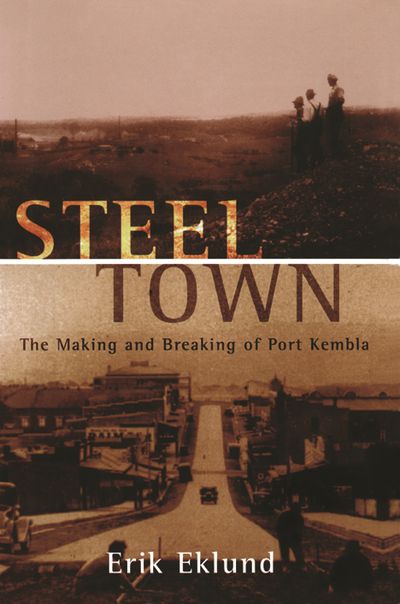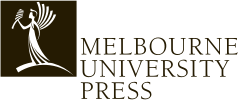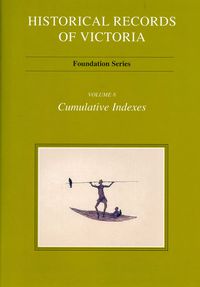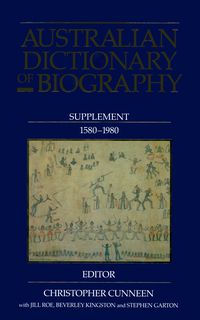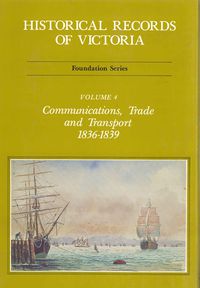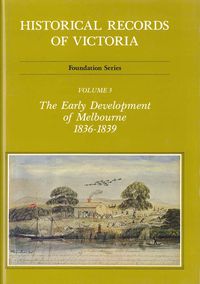Steel Town
The Making and Breaking of Port Kembla
Erik Eklund
Hardback
Out of stock
$39.99
Member discount
As an MUP member you get 40% off the price of this book.
Member discount
As an MUP member you get 40% off the price of this book.
Member discount
As an MUP member you get 100% off the price of this book.
Member discount
As an MUP member you get 25% off the price of this book.
Member discount
As an MUP member you get 25% off the price of this book.
Member discount
As an MUP member you get 25% off the price of this book.
Member discount
As an MUP member you get 40% off the price of this book.
Member discount
As an MUP member you get 10% off the price of this book.
Member discount
As an MUP member you get 35% off the price of this book.
Member discount
As an MUP member you get 40% off the price of this book.
Other formats available
- Ebook$25.99 $25.99 $25.99 $25.99 $25.99
Steel Town
The Making and Breaking of Port Kembla
Erik Eklund
The story of Port Kembla illuminates our understanding of the processes of industrial and social change.
The sun moves across the narrow coastal plain that borders the range to the north . . . It shows once separate places now merged into one suburban entity, a ribbon of residential, commercial and industrial development . . . There is a commercial centre whose tall metallic and glass structures reflect the light, and celebrate an industrial heritage. And to the south, an area where a mass of industrial buildings converge around a large harbour. This area stands as a telling symbol of the region's golden industrial age.
To most Australians Port Kembla is a grimy, polluted, industrial wasteland located down the coast from Sydney. Such images were formed over fifty years ago when industrial development in the town was at its height, and when the expanse of breathtaking coast had been colonised by the stacks and furnaces of heavy industry. Yet the vision of stacks and pollution from…
To most Australians Port Kembla is a grimy, polluted, industrial wasteland located down the coast from Sydney. Such images were formed over fifty years ago when industrial development in the town was at its height, and when the expanse of breathtaking coast had been colonised by the stacks and furnaces of heavy industry. Yet the vision of stacks and pollution from…
The sun moves across the narrow coastal plain that borders the range to the north . . . It shows once separate places now merged into one suburban entity, a ribbon of residential, commercial and industrial development . . . There is a commercial centre whose tall metallic and glass structures reflect the light, and celebrate an industrial heritage. And to the south, an area where a mass of industrial buildings converge around a large harbour. This area stands as a telling symbol of the region's golden industrial age.
To most Australians Port Kembla is a grimy, polluted, industrial wasteland located down the coast from Sydney. Such images were formed over fifty years ago when industrial development in the town was at its height, and when the expanse of breathtaking coast had been colonised by the stacks and furnaces of heavy industry. Yet the vision of stacks and pollution from furnaces was never the whole story—there was always more to Port Kembla. Although these ideas persist even today, they obscure the real experiences of the people of the port.
Steel Town illuminates our understanding of the processes of industrial and social change. Port Kembla was unique in Australian terms—an urban environment where industrial society shaped local life and politics like nowhere else. This book explores the advent and implications of industrial society—and the impact of economic decline and deindustrialisation.
In his comprehensive and persuasive account of local life Erik Eklund draws together themes of migration, gender, class and identity. Using archival records, oral history interviews and company documents, Steel Town charts the relationship between economic change and the human experience of that change.
The story of Port Kembla is the story of the 'big issues' of Australian history writ small on the lives of three generations of local people. The legacy of industrial society is a mixed one; its experiences and consequences are full of contradictions. And that, of course, is the beauty of history.
To most Australians Port Kembla is a grimy, polluted, industrial wasteland located down the coast from Sydney. Such images were formed over fifty years ago when industrial development in the town was at its height, and when the expanse of breathtaking coast had been colonised by the stacks and furnaces of heavy industry. Yet the vision of stacks and pollution from furnaces was never the whole story—there was always more to Port Kembla. Although these ideas persist even today, they obscure the real experiences of the people of the port.
Steel Town illuminates our understanding of the processes of industrial and social change. Port Kembla was unique in Australian terms—an urban environment where industrial society shaped local life and politics like nowhere else. This book explores the advent and implications of industrial society—and the impact of economic decline and deindustrialisation.
In his comprehensive and persuasive account of local life Erik Eklund draws together themes of migration, gender, class and identity. Using archival records, oral history interviews and company documents, Steel Town charts the relationship between economic change and the human experience of that change.
The story of Port Kembla is the story of the 'big issues' of Australian history writ small on the lives of three generations of local people. The legacy of industrial society is a mixed one; its experiences and consequences are full of contradictions. And that, of course, is the beauty of history.
Hardback
Out of stock
$39.99
Member discount
As an MUP member you get 40% off the price of this book.
Member discount
As an MUP member you get 40% off the price of this book.
Member discount
As an MUP member you get 100% off the price of this book.
Member discount
As an MUP member you get 25% off the price of this book.
Member discount
As an MUP member you get 25% off the price of this book.
Member discount
As an MUP member you get 25% off the price of this book.
Member discount
As an MUP member you get 40% off the price of this book.
Member discount
As an MUP member you get 10% off the price of this book.
Member discount
As an MUP member you get 35% off the price of this book.
Member discount
As an MUP member you get 40% off the price of this book.
Other formats available
- Ebook$25.99 $25.99 $25.99 $25.99 $25.99
